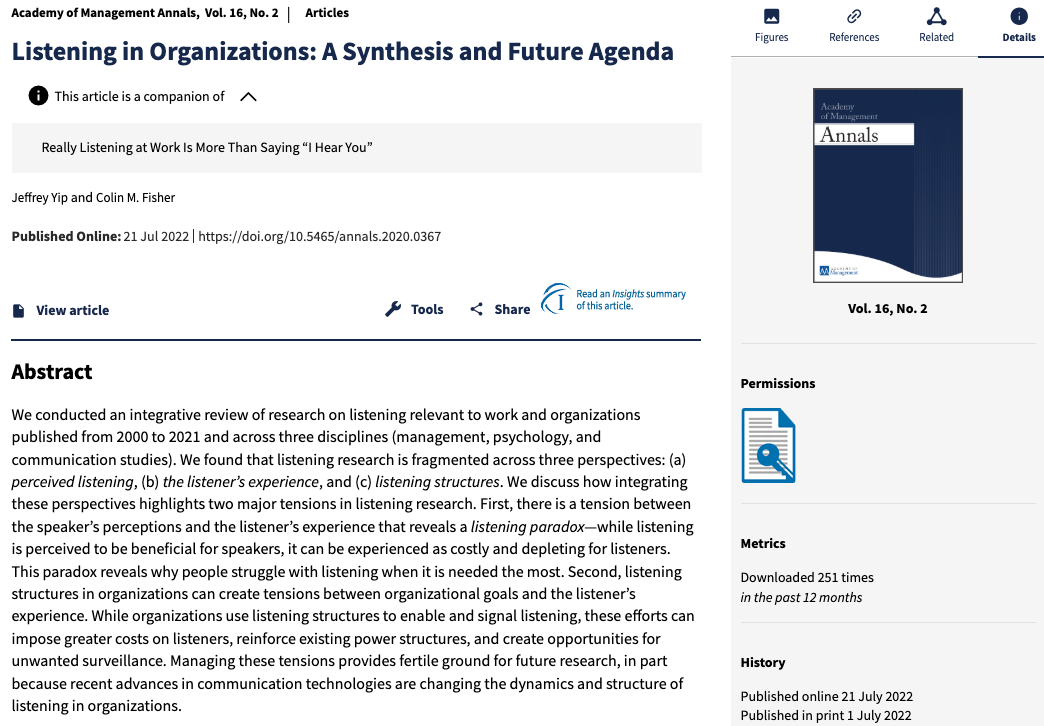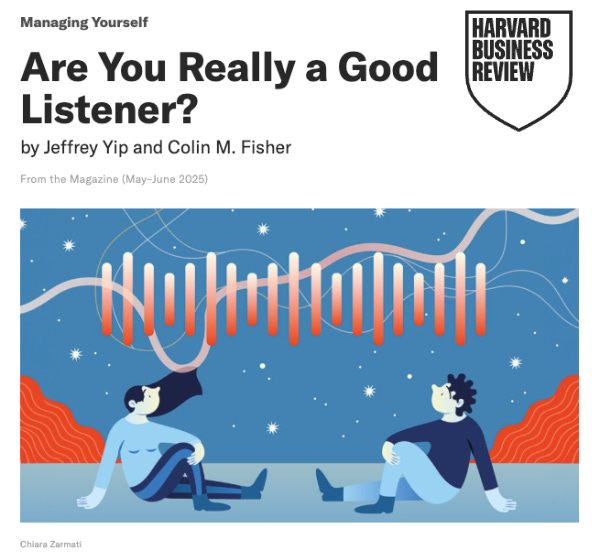Issue 14: The Five Deadly Sins of Listening
And the story of the research that uncovered them
This is The Collective Edge (formerly The Fishbowl), a community for curious people to learn how the science of groups and organizations can help us live and work better together. And have a little fun along the way.
At The Collective Edge, you’ll get twice-monthly newsletters that help you understand and shape your own moments of collaboration and creativity, mixing essays and interviews. You’ll also learn about social science, the writing process, and the non-stop action of academic careers.
Am I a good listener? I’m not so sure. Carola, official spouse and editor of TCE Newsletter, would probably tell you that I’m, as the kids say, “mid.” My hearing is somewhat damaged from years of playing a loud instrument in loud bands. And even if I discern your words, the chances are high that your words send me chasing non-sequiturs into my subconscious. I’m also easily distracted by any nearby movement. After all, it could be an owl or chinchilla!
Because we professors often study what we don’t understand, I’ve been studying listening at work. Also, listening is important! It’s a necessary ingredient to all kinds of important worky stuff, like leadership, help, improvisation, and teamwork.
The mastermind behind my listening research programme is Simon Fraser University professor Jeff Yip. Jeff and I wrote about the lessons from studying workplace listening in our recent Harvard Business Review article, "Are You Really a Good Listener?”
I’m not going to sit here and paraphrase an already carefully phrased article (OK, I’ll do a bit of that later). You can go read it in all of its para-less glory.
Instead, let’s do an origin story. It all started when Jeff and I were bitten by this radioactive fennec fox…

Because fennec foxes have large ears and incredible hearing, the bite made us ravenous for research about workplace listening. Because the fox’s radioactivity was like the radioactive spider that turned Peter Parker into Spider-Man. Did it give us super-listening powers? No. Did it give us a voracious appetite for reading scholarly papers about listening? Yes. Yes, that is my truth.
For years, we read every article relevant to workplace listening we could get our hands on. OK, Jeff did most of the reading. He took the more severe fox bite, after all.
We noticed that there wasn’t a recent review of the workplace listening literature in a major journal. So we proposed a review of workplace listening to Journal of Management.
That proposal was rejected. So we gave up.
Hahaha, just kidding! We then did a better job of proposing and sent it to Academy of Management Annals. The review team liked it and invited us to submit a full article.
But guess what? We weren’t the only ones who noticed that there wasn’t a recent review. After we submitted the full manuscript and worked on this for about a year, another review was published! That’s usually an academic’s worst nightmare - getting scooped.
Luckily, we had a wonderful editor, Elizabeth Morrison. She encouraged us to double down on the differences in scope and conclusions between the two articles.
One important difference was that we noticed the rather rosy tone of listening research. Most studies posited that listening at work is AWESOME—it leads to all manner of salutory outcomes, healing ills from political polarization to loneliness.
Now, I don’t doubt these findings. It is indeed wonderful and rare to be listened to! Conversely, when you feel unheard by your colleagues—that they don’t understand your messages and/or intentions—it kinda sucks.
But those conclusions are about the effects of listening on speakers. It doesn’t tell us much about the effects of listening on listeners. The little research about listeners in the workplace suggests that, like me, many people find high-quality listening to be quite taxing. Especially leaders and managers.
When managers listen at work, it often isn’t light banter or gossip flowing into their ears. It’s more often venting, complaints, and suggestions. It’s more problems than praise. And, because most organizations don’t treat listening as “real” work, managers who are good listeners get exhausted and perform worse at their own jobs. Sometimes, they get so burnt out that they end up mistreating others in the long run.
In the end, I’ve come to view listening at work as a paradox. Listening is generally good for speakers. But it is costly for listeners. And the ways that organizations structure and reward listening often increase those costs on just a few.

That’s why our HBR article was originally titled “The Five Deadly Sins of Listening.” We wanted to highlight what makes listening at work difficult—and how it can go wrong.

TLDR
If your clicking fingers ain’t working now, here’s a summary of the article:
Research has shown that when employees feel heard, their engagement rises and their performance improves, delivering big benefits to their firms. Yet 117 studies on workplace listening reveal that many managers aren’t good listeners. Why? Because listening is mentally taxing and demands empathy and patience. This article describes the five common causes of poor listening and explains ways to counter each.
The first pitfall is haste. To avoid it, set aside distraction-free time for conversations, ask clarifying questions, seek more details, and plan follow-up discussions.
The second pitfall is defensiveness. When you experience this, you need to calm your emotions, buy yourself time by restating what you’ve heard, and get more information before responding.
The third pitfall is invisibility—not showing that you’re listening. So demonstrate that you are with body language and verbal cues and by summarizing what people have told you.
The fourth pitfall is exhaustion, which prevents leaders from engaging productively. Setting clear boundaries and acknowledging your limits will help you address this problem.
The last pitfall is inaction. The fix here is to always close the loop: Before ending a conversation, affirm what you’ve heard, identify next steps, and agree on a timeline for checking back in.
Do you have enough T-CELs in your life?
Book stuff is starting to take over my life—in a good way! I’ve been interviewed for two podcasts about the book, with more in the pipeline. I signed the contract to record the audiobook (I’ll be reading it - hooray!). I started working with a new speakers’ bureau here in the UK. There are all kinds of promotional texts for me to review and edit. There are pitches for articles based on the book.
But the most exciting are early reviews—like this one from the fabulous
!I’ll be sharing more of the behind-the-scenes journey in special posts for The Collective Edge Launch Team (T-CEL Team), coming very soon. (And a theme song).
If you’ve pre-ordered the book or are planning to, you might as well join T-CEL Team. If you tell your friends and family about the book or agree to post about it on socials, you get all kinds of goodies:
An early NetGalley copy of the book to read before anyone else! (This will be soon - much sooner than Sept 2)
12 months of complimentary paid subscription to Colin's Newsletter, The Collective Edge (when paid subscriptions are reactivated after the book comes out)
Early access to guides for groups and other bonus material
Promotional graphics that members can use to spread the word about the book on socials, newsletters, or elsewhere
Exclusive musical interludes from Colin and associates, composed for T-CEL Team members (probably the most valuable part of this)
You’d be a silly chinchilla indeed NOT to take this offer. So, please sign up for T-CEL Team. If clicking on the link and entering your email is too much, you can just put a comment below saying “sign me up!” and I’ll do it for you. PLEASE! DON’T MAKE ME BEG!









Great issue! Love the graphics!